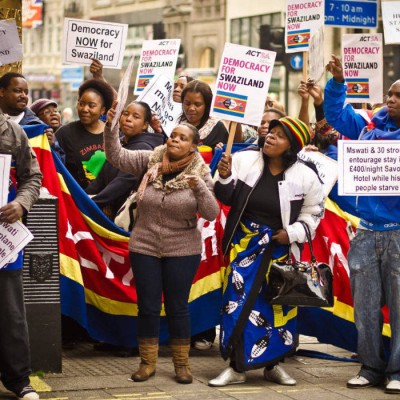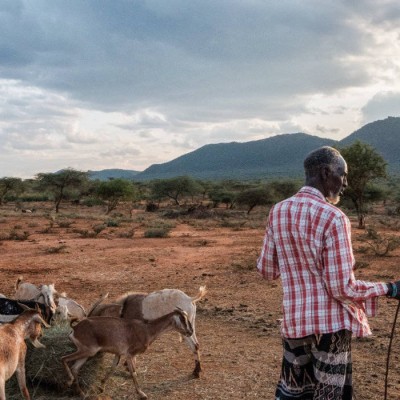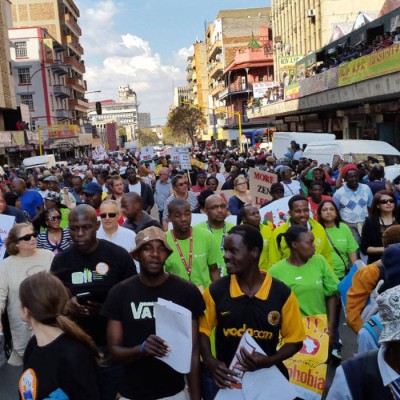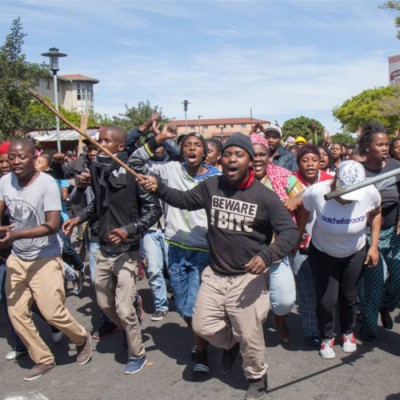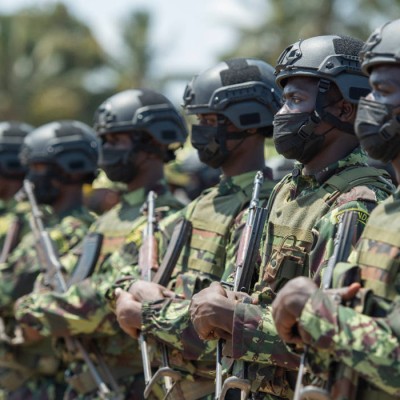Introduction
The incidence of banditry in Nigeria has attracted enormous attention in scholarship, with writers paying attention to the causes of the security impasse and its effect on securitisation, development and national cohesion. Despite the attention garnered, banditry in Nigeria appears to be growing deadlier, especially in the northwest, where it has reportedly killed more than 20 000 people in the last ten years, demanded millions of dollars in ransom, and displaced millions of people after destroying villages. These gangs, which initially only targeted rural areas, have significantly increased their operations to include major cities, interstates, and infrastructure, including train lines and military targets, and their tactics have progressed to include the use of powerful weapons, such as anti-aircraft missiles and explosives.1Bukarti, Audu (2022) ‘Democracy Under Threat: Why the Security Risks to Nigeria’s 2023 Elections Must Not Be Overlooked’, Available at: <https://institute.global/policy/democracy-under-threat-why-security-risks-nigerias-2023-elections-must-not-be-overlooked> [Accessed 20 October 2022].
Bandits are notorious for abducting schoolchildren and attacking educational facilities. For instance, over 2 600 citizens were slain by armed bandit groups in 2021, an increase of more than 250% from the previous year. At least 360 people were killed by bandits in Kaduna State alone between January and March 2022. More than 100 people were killed on 10 April during attacks on numerous communities in the Kanam Local Government Area, Plateau State.2Global Centre for the Responsibility to Protect (2022) ‘Nigeria’, Available at: <https://www.globalr2p.org/countries/nigeria> [Accessed 18 October 2022].
The root causes of banditry include poverty, youth unemployment, climate change, bad governance, corruption and the lack of adequate security protection for vulnerable communities.3Ibid. The proliferation of small and light weapons, a weak security infrastructure, inadequate leadership, cattle rustling, herder-farmer conflict, and illicit mining operations in the North West are further contributing factors for banditry. In addition to the human cost of banditry, it has a significant economic impact on the country. Banditry and other forms of armed violence cost the Nigerian economy billions of dollars each year. The problem is likely to continue to grow unless effective measures are implemented to address it.
Efforts to address the problem of banditry in Nigeria have included both military and nonmilitary approaches. The Nigerian government deployed troops to affected areas and implemented economic and development programmes in an attempt to reduce poverty and provide alternatives to banditry. However, these efforts have yielded mixed results, and the problem persists. Some experts have argued that a more comprehensive and multifaceted approach is needed to address the root causes of banditry in Nigeria and effectively combat the problem. This could include increased investment in law enforcement and the criminal justice system, promoting economic development and reducing poverty, as well as efforts to prioritise community mobilisation.
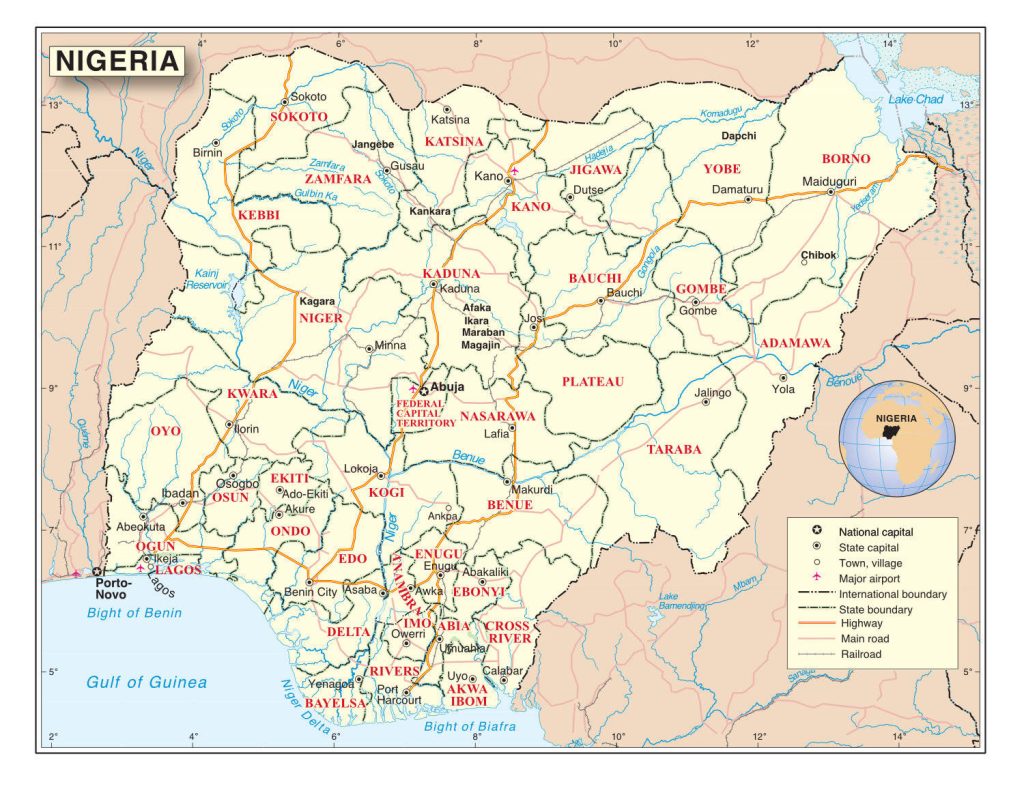
Community Mobilisation
Community mobilisation is a process of engaging and empowering members of a community to take ownership of and actively participate in addressing issues and challenges facing the community. It involves bringing together various stakeholders within a community, such as community leaders, local organisations, and government agencies, to work towards a common goal. It is aimed at engendering solutions to support good governance, accountability, representative participation and peaceful change.4Mercy Corps (2009) ‘Community Mobilization: Sector approach’, Available at: <https://www.mercycorps.org/sites/default/files/2020-01/CommunityMobilizationSectorApproach_0.pdf> [Accessed 11 October 2022]. Participation in community mobilisation is about addressing the interests of the entire community.
Successful Community Mobilisation Initiatives in Nigeria
One example of a successful community mobilisation in Nigeria is the Save One Million Lives campaign launched by the government in partnership with international organisations and non-governmental organisations (NGOs). The campaign aimed to reduce child and maternal mortality rates in Nigeria by providing better access to healthcare services and information. The campaign used a variety of strategies, including community mobilisation, to reach people in remote and underserved areas of the country.5World Bank (2015) ‘Nigeria – Saving One Million Lives Initiative Program-for-Results (PforR) Project’. Washington, D.C.: World Bank. Available at: <http://documents.worldbank.org/curated/en/322711468100158289/Nigeria-Saving-One-Million-Lives-Initiative-Program-for-Results-PforR-Project> [Accessed 11 October 2022]. Another successful initiative was the Polio-Free Nigeria campaign, which was launched in 2004 and aimed to eradicate polio in Nigeria. The campaign used community mobilisation strategies to raise awareness about the importance of vaccination and encourage people to vaccinate their children. The campaign was successful in reducing the number of polio cases and contributed to the country being declared polio-free in 2015.
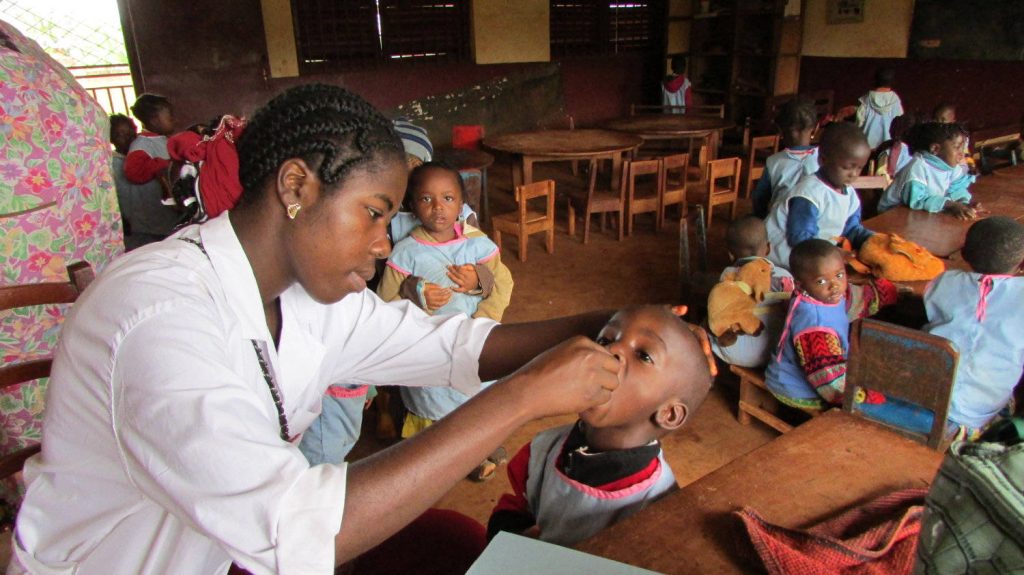
Photo: Louie Rosencrans/CDC
Other examples include the Community-Based Health Planning and Services (CHPS) initiative and the Community Development Association (CDA) model. The CHPS initiative aims to involve communities in the planning and implementation of health services at the local level, with a focus on primary healthcare. The CHPS initiative has been successful in improving access to healthcare in rural areas of Nigeria, with communities playing an active role in the planning and implementation of health services. The Third National Development Plan for Nigeria, which covered the years 1975–1980, adopted the CDA model, and can be traced back to precolonial Nigeria.6Oyalowo, Basirat (2021) ‘Community Development Associations in Low Income and Informal Communities in Nigeria’, Available at: <https://ng.boell.org/sites/default/files/2021-09/Community%20Development%20Associations%20in%20Low-Income%20and%20Informal%20Communities%20in%20Nigeria.pdf> [Accessed 18 October 2022]. The mission of the CDA is to foster meaningful physical development in towns and villages, to act as an institutional conduit for active citizen engagement in democratic governance, and to foster community self-reliance and the growth of social capital. The CDA model has been successful in mobilising communities in Nigeria, leading to increased participation in the decision-making process, improved delivery of services, and increased accountability of local government authorities.
Community Mobilisation and Banditry in Nigeria
Benefits of Involving the Community in Combating Banditry
Involving the community in a solution to the problem of banditry in Nigeria can have numerous benefits, such as increasing the effectiveness of interventions and leading to sustainable solutions. This is because community members have local knowledge and are more familiar with the context and needs of the area, which can help tailor interventions to make them more relevant and impactful. Additionally, involving the community in problem-solving can foster a sense of ownership and responsibility for the issue at hand, which can lead to increased support and commitment to finding a solution. This is especially important in the case of banditry, which is a complex and multifaceted problem that requires the buy-in and participation of all stakeholders. Furthermore, involving the community in the decision-making process can lead to a more inclusive and democratic approach to problem-solving, which can help build trust and strengthen relationships between different groups. This is particularly important in Nigeria, where there are often deep-seated divides and tensions between communities and stakeholders.
Among other potential benefits of involving the community is that it can help empower individuals and give them a sense of agency and control over issues that affect their lives. This can be especially important in the context of banditry, which can have a significant impact on the daily lives and well-being of community members. By participating in the process of finding a solution, individuals may feel more invested in the outcome and are more likely to take action to address the problem.
Involving the community can also provide an opportunity for individuals to share their experiences, insights, and perspectives on the issues at hand. This can be particularly valuable in the case of banditry as it may reveal underlying issues or root causes that might not be apparent to outsiders. By listening to and incorporating the voices of community members, policymakers and practitioners can gain a more nuanced understanding of the problem and develop targeted and effective interventions.
Another potential benefit of involving the community is that it can help to build social cohesion and foster a sense of community identity. In the context of banditry, this can be especially important, as it may help to reduce tensions and conflicts between different groups and promote a sense of shared purpose. By working together to find solutions, individuals may be more likely to develop a sense of mutual understanding and respect, which can help lay the foundation for more peaceful and harmonious relationships in the future.
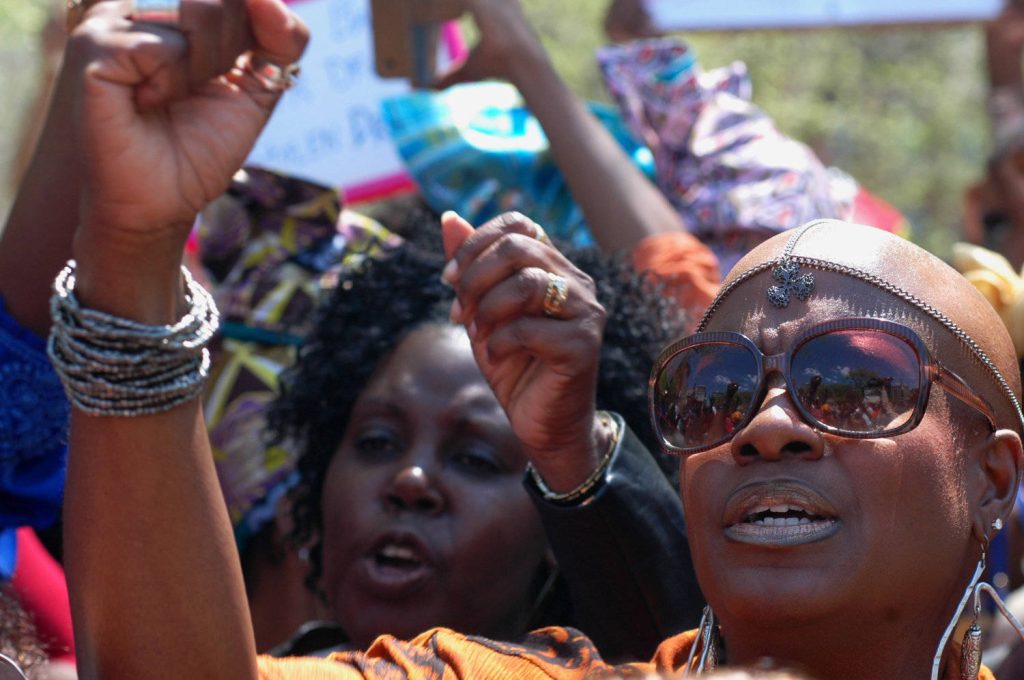
Photo: Michael Fleshman
Community Mobilisation Initiatives Against Banditry
Community Policing
One of the community mobilisation strategies used to combat banditry in Nigeria is community policing. Community policing is a philosophy and strategy that focuses on the proactive and collaborative partnership between the police and the community to identify and solve problems of crime, disorder, and public safety. It is based on the idea that the police and the community are partners in the crime-fighting process, and the police are responsible for working with the community to address the root causes of crime and disorder, rather than just reacting to incidents as they occur. One recent example of community policing is the establishment of Operation Puff Adder I and II in Kaduna State. The first operation was launched in 2019 and the second in 2021 to dislodge bandits in Kaduna, Niger, Zamfara, Nasarawa Katsina and Kogi states. The operations involve the deployment of mobile police units to vulnerable communities, as well as the training of community policing committees to work with the police to identify and report potential criminal activity. The goal of the initiative is to improve the safety and security of communities by building trust and cooperation between the police and the public.7Nwezeh, Kingsley (2021) ‘Police Launch Operation Puff Adder II for North-west, North-central’, This Day. Available at: <https://www.thisdaylive.com/index.php/2021/02/16/police-launch-operation-puff-adder-ii-for-north-west-north-central> [Accessed 19 October 2022].
To consolidate security, the federal government granted N13.3 billion in 2021 for the launch of the Community Policing initiative nationwide. The president also established the Nigerian Police Trust Fund to address the funding issues facing the police and vowed to increase investment in equipment for efficient service delivery.8Crimefighters (2021) ‘President Buhari Approves N13.3bn for Take-Off of Community Policing Initiative’, Available at: <https://crimefightersng.com/president-buhari-approves-n13-3bn-for-take-off-of-community-policing-initiative> [Accessed 18 October 2022].
Vigilante Groups
Vigilante groups consist of individuals protecting their community, often outside the formal justice and policing system. Vigilante groups may be formed in response to a perceived lack of action or effectiveness by the police or other authorities in addressing a particular problem, such as crime or disorder. In Nigeria, vigilante groups have been used as a strategy to combat banditry. One example is the establishment of the Civilian Joint Task Force (CJTF) in Borno state. The CJTF is a group of volunteers who work alongside the Nigerian military to combat the Boko Haram terrorist group, which has been responsible for several high-profile attacks and kidnappings in Northeast and Northwest Nigeria. The CJTF has been credited with helping reduce violence and insecurity in the area. Members of the CJTF have also been trained by the Special Task Force codenamed Operation Safe Haven on how to monitor the activities of criminal elements and report on them.9Ahovi, Isa (2022) ‘Plateau: Operation Safe Haven trains 165 persons on information gathering’, The Guardian, Available at: <https://guardian.ng/news/plateau-operation-safe-haven-trains-165-persons-on-information-gathering> [Accessed 20 October 2022].
The Hisba, which operates in parts of the Northwest, the Western Nigeria Security Network (also known as Amotekun) in the southwest, and the Ebubeagu Security Network in the southeast are other vigilante groups that operate at the local level. Even though some of these organisations do not receive much formal recognition from the federal government or the Nigerian police, they still play important policing roles in the collection of intelligence and reducing crime and violence in their respective regions. Other vigilante groups committed to combating cattle rustling and banditry were the Vigilante Groups of Nigeria and Yan Sakai. The Igala Youths Vigilante Group formed in Kogi state is another vigilante group that combats banditry in the area. The group, made up of volunteers from the local community, works alongside the police to identify and report criminal activity.

Photo: AMISOM / Ilyas Ahmed
Challenges of Community Mobilisation in Combating Banditry
Community mobilisation against banditry has proven to be a challenging endeavour in Nigeria. A significant challenge is the lack of resources, including funding, personnel, and equipment, which can limit the scope and effectiveness of community mobilisation efforts. Additionally, there may be a lack of political will to address the issue of banditry, as government officials may prioritise other issues or be unwilling to allocate resources to address the problem. Vigilante groups may also become repressive and corrupt.10Oke, Chris; Braimah, Frederick; and Masajuma, Florence (2021) ‘Policing through the community in Nigeria: The missing link in security architecture’, Ikenga: Journal of African Studies, 22(2), 146–162. In the first instance, Nigerian police are plagued with a paucity of funds. Many police departments in Nigeria are underfunded and understaffed, which can make it difficult for them to implement community policing strategies effectively. Concerning the lack of training and support, many police officers in Nigeria are not trained in the principles of community policing, and may be more accustomed to using traditional authoritarian approaches to law enforcement.
Using vigilante groups to fight banditry in Nigeria is also constrained by a lack of training and resources to combat crime effectively. In some cases, vigilante groups may be more focused on retribution and punishment than on reducing crime, leading to further violence and conflict in the community. Some vigilante groups in Nigeria have been accused of extorting money from the communities they are supposed to protect and of participating in illegal activities such as drug trafficking. This is true in the case of Yan Sa-Kai, whose members were accused of using excessive force and committing human rights abuses, including torture and extrajudicial killings.11International Crisis Group (2022) ‘Managing Vigilantism in Nigeria: A Near-term Necessity’, Africa Report No. 308, Available at: <https://icg-prod.s3.amazonaws.com/308-vigilantism-in-nigeria.pdf> [Accessed 11 October 2022]. In addition, the group was accused of extorting money from community members and engaging in corruption. As a result, the Katsina government decided to disband Yan Sa-Kai and integrate its members into formal security forces.
Other barriers to community mobilisation include a lack of trust in the government and law enforcement agencies, which is often due to the history of corruption and the abuse of power by these institutions. As a result, many communities are hesitant to report incidents of banditry or work with authorities to address the issue. Another barrier to community participation is the fear of retaliation from bandits themselves. In some cases, bandits have targeted communities that speak out against their activities or cooperate with authorities. This fear can prevent individuals from coming forward with information or actively participating in efforts to combat banditry.
There is also the challenge of a lack of comprehensive data on the banditry in Nigeria, which can make it difficult to design and implement effective community mobilisation strategies. There is a need for more in-depth research on the root causes and dynamics of banditry to inform the development of targeted and effective interventions.
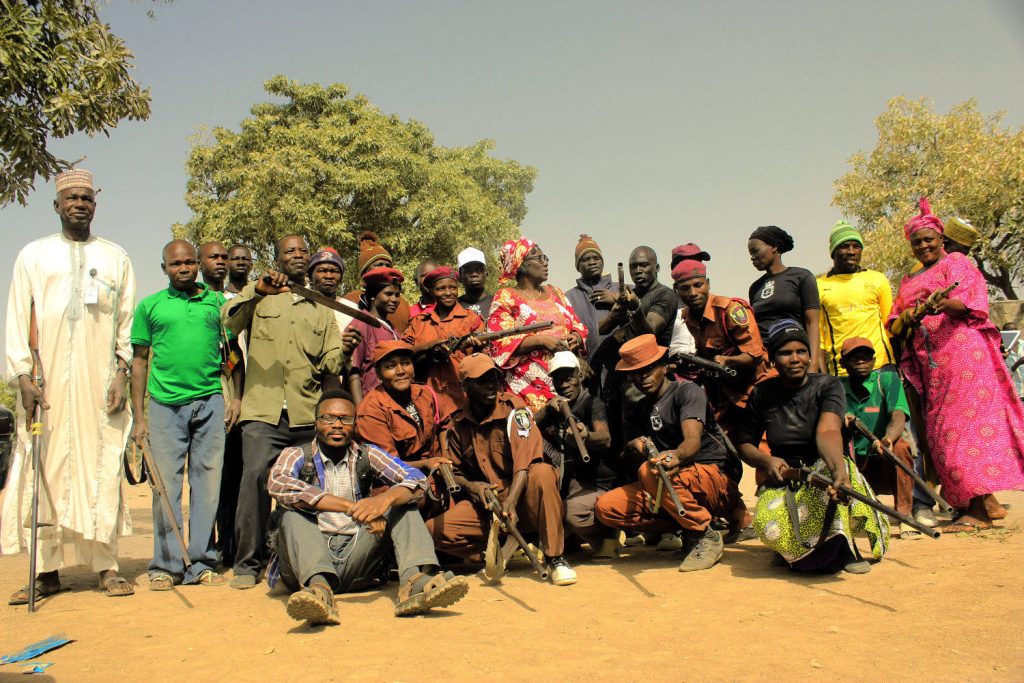
Photo: Immanuel Afolabi/ Conflict & Development at Texas A&M.
Strategies for Overcoming the Challenges
One effective strategy is to increase community awareness and understanding of this issue. This can be accomplished through education campaigns and public information efforts, which can help raise awareness of the dangers of banditry and encourage community members to take action to prevent it. Another strategy is to engage local leaders and influencers to mobilise communities against banditry. These individuals can play a key role in mobilising and organising community members and can help build support for efforts to address this issue.12Pigg, Kenneth (2009) ‘Three Faces of Empowerment: Expanding the Theory of Empowerment in Community Development’, Journal of the Community Development Society, 33(1), 107–123.
It is also important to build strong partnerships with local organisations and institutions, such as schools, religious groups, and civil society organisations. These groups can provide valuable resources and support for community mobilisation efforts and can help create a sense of shared ownership and responsibility for addressing the problem.
Furthermore, it could be helpful to establish a system for reporting and responding to banditry incidents. This can include setting up a hotline or other system for reporting crimes as well as establishing protocols for responding to and investigating incidents. By providing a mechanism for community members to report crimes and receive support and assistance, it may be possible to improve community mobilisation efforts and reduce banditry.
The Role of Community Leadership and Empowerment
Community leadership and empowerment are crucial components of successful community mobilisation efforts. This is because community-led initiatives are more likely to be sustainable and effective in addressing local problems as they draw on the unique strengths, resources, and experiences of the community. Local leaders’ involvement in the planning and implementation of a community development project may significantly increase its impact and sustainability. This is because local leaders have a deep understanding of the community’s needs and challenges and can rally community members around a shared vision for change.13Ibid, pp. 118–119. In addition, empowering community members to take ownership of their development can lead to increased pride and a sense of accomplishment as well as fostering a culture of community-led problem-solving. This is especially important in marginalised or disadvantaged communities, where individuals may feel disempowered or lack agency in shaping their futures.
Community leadership and empowerment can facilitate the transfer of knowledge and skills within the community, as local leaders and community members share their expertise and experiences. This can help build the capacity of a community to address its challenges and needs, leading to more self-sufficient and resilient communities. Communities are more likely to achieve sustainable and impactful outcomes by empowering local leaders and community members to play a central role in the planning and implementation of initiatives.

Photo: UN Women/Urjasi Rudra
Conclusion
Community mobilisation against banditry in Nigeria has proven to be an effective strategy for reducing the prevalence of this criminal activity. One approach to improving community mobilisation efforts is community policing and vigilantism. Community policing increases trust and collaboration between law enforcement and community members, which leads to a reduction in crime rates. To improve these efforts, the use of social media and other digital platforms for community mobilisation against banditry is recommended. Social media can be an effective tool for organising and mobilising communities to take action against crimes. This can be especially useful in rural areas where traditional forms of communication may be limited. The involvement of community members in the decision-making process and providing them with resources and support is equally recommended. This can be effective in improving community mobilisation efforts. It includes providing training and capacity building for community leaders as well as supporting community-led initiatives to address the root causes of banditry. Finally, it is important to adopt a holistic and multifaceted approach to improve community mobilisation against banditry in Nigeria. By utilising a combination of community policing, social media, and community involvement, it is possible to mobilise communities effectively and reduce security threats.
Tope Shola Akinyetun teaches Political Science at Lagos State University of Education, Lagos, Nigeria. His research focuses on insecurity, identity politics, democratisation, technopolitics and development studies.



